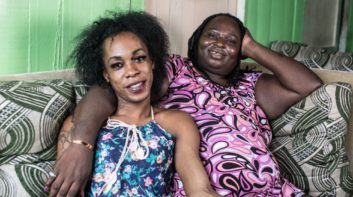Cambodia
 © Eugenie Dolgberg for Frontline AIDS
© Eugenie Dolgberg for Frontline AIDS
Cambodia has halted and reduced the transmission of HIV, with new infections dropping from 3,900 in 2005 to less than 1,000 in 2019.
The HIV epidemic in Cambodia continues to be concentrated among certain groups of people at higher risk of infection: sex workers, men who have sex with men (MSM), transgender people, people who inject drugs, and prisoners.
Compared with other marginalised groups, people who inject drugs have the highest HIV prevalence at 15.2%. They also have by far the lowest treatment coverage at 30.8%.
To address this, Cambodia has worked hard to provide harm reduction methods for people who use drugs. These initiatives include as needle and syringe programmes (NSP) and opioid substitution therapy (OST).
Did you know?
- Less than 1,000 new HIV infections occur in Cambodia each year, a 62% reduction since 2010.
- Cambodia has reached the 90-90-90 targets for testing and treatment, meaning that 90% of people living with HIV know their status, 90% of people living with HIV are on treatment, and 90% of people on treatment are virally suppressed.
- The country has high coverage of needle and syringe programmes – a harm reduction initiative for people who use drugs.
Meet one of Our partners
We have been responding to HIV in Cambodia for over 20 years. What started as an Alliance project in 1997 has now grown into KHANA, the largest non-governmental organisation working on HIV in Cambodia.
Although the number of new infections has decreased significantly, we need to keep working to see this number fall even further. KHANA’s work helps prevent new infections, particularly among the most marginalised groups.
KHANA has a research branch called Khana Center for Population Health Research that produces high quality research on HIV and key populations.
OUR IMPACT IN CAMBODIA
In 2019, KHANA:
- Reached almost 30,000 people in marginalised populations with sexual reproductive health and rights interventions including HIV. This included over 9,000 MSM, 18,000 sex workers, and 2,600 transgender people.
- Published an impressive 16 peer-reviewed journal articles. The topics included:
- Social marginalisation, gender-based violence, and binge drinking among transgender women
- The links between HIV prevention programmes and increased empowerment, inclusion and agency for marginalised populations who demand equal rights
- Prevalence of risk factors of HIV infection among people who inject drugs
- Methods to build a mobile health intervention among sex workers in Cambodia.
Will you help us end aids?
I would like to make a donation of:
Please enter the amount you would like to donate, ie: '10.00'

